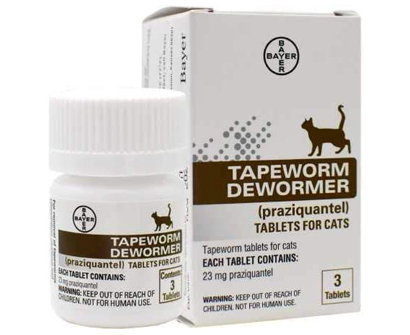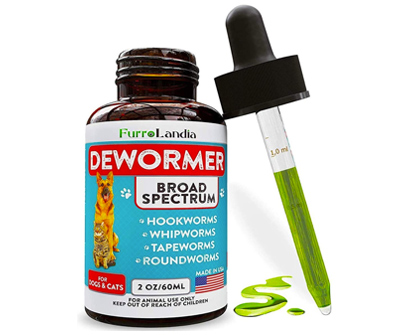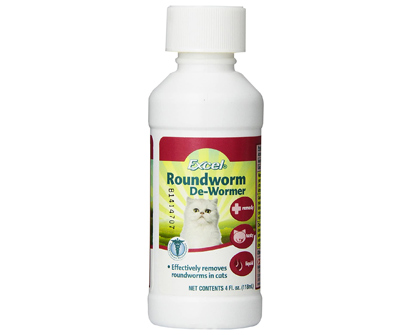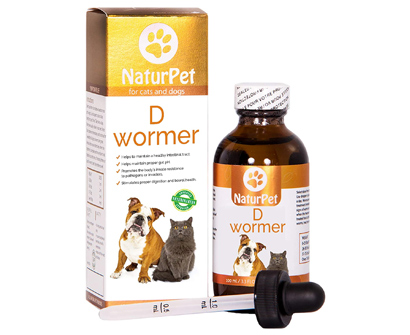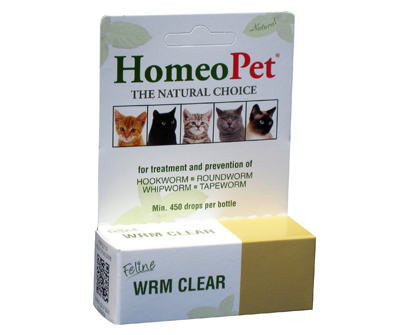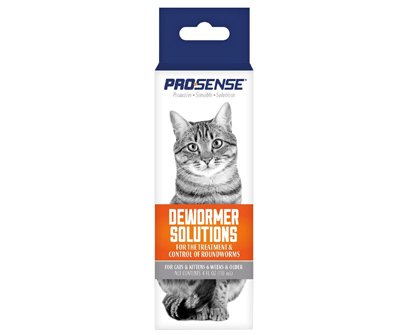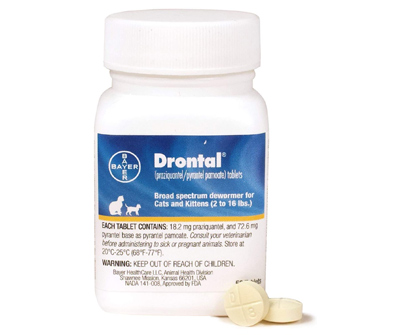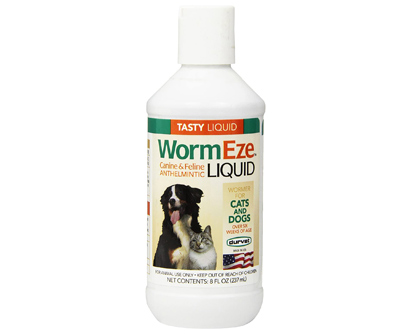The Best Dewormers For Cats in 2022

- The Best Dewormers For Cats
- 1. Bayer Tapeworm Dewormers For Cats
- 2. FurroLandia Dewormers For Cats
- 3. Excel Liquid Roundworm Dewormer for Cats
- 4. NaturPet Effective Cat Dewormer
- 5. HomeoPet Feline WRM Clear Cat Supplement
- 6. ProSense Liquid Cat Dewormer
- 7. Bayer Animal Health Drontal Broad Spectrum Cat Dewormer
- 8. Durvet WormEze Liquid Feline Antihelmintic
When it comes to the health of your cat, one of the most common complaints are parasitic worms, which can leave your kit looking and feeling nowhere near their best. Worms affect your pet’s digestive system and can upset their toilet habits, dull their coat and even lead to more serious problems, such as anemia or an intestinal blockage, if left untreated. It is so easy for your cat to pick up worms, as they can be transferred via eating, contact with other animals’ infected feces and even fleas. But the good news is that with the right dewormer, cat worms can be easily treated and once the intestinal parasites have been eradicated, kept that way via a regular worming program. To help keep your cat's body happily worm-free, we give the lowdown on some of the best dewormers for cats you can buy.
The Best Dewormers For Cats
1. Bayer Tapeworm Dewormers For Cats
Key Features
Fast and effective treatment for common tapeworms
Contains three 23mg praziquantel tablets
Can be crumbled into food for easy administration
For cats over six weeks of age
The top pick in our best cat dewormers review is this three-tablet pack designed to rid your kit of troublesome tapeworms, one of the most common parasites to affect felines. One single dose should be enough to kick those tapeworms to the curb and these praziquantel tablets from market leading Bayer are fast acting too. Simply crumble and mix with your pet’s food and let the tablet do its tapeworm busting work. These cat worming tablets are safe to use at home, there’s no need for a prescription and at less than $15, are a cost-effective way to keep your precious pet tapeworm free. Only for use with cats over the age of six weeks.
2. FurroLandia Dewormers For Cats
Key Features
Natural broad spectrum dewormer
Deals with all the main worms affecting cats and dogs
Can be used on cats of all ages
Contains non-GMO natural ingredients
As a broad spectrum dewormer, this natural formula from FurroLandia tackles all the common worms that may affect your cat or dog, including tapeworms, whipworms, roundworms and hookworms. Using natural ingredients, it’s also gentle on your pet’s system and is quick and easy to use. The liquid formula can be mixed with food or applied directly into their mouth and is safe for dogs and cats of all sizes. You simply adjust the quantity via the dropper according to their size. This broad spectrum natural dewormer is also good value as it lasts up to five months and can be used every day to keep those worms at bay. The GMO-free active ingredients list includes clove bud, grapefruit seed extract, apple cider vinegar and wormwood.
3. Excel Liquid Roundworm Dewormer for Cats
Key Features
Liquid dewormer for large roundworm
Great value four-ounce bottle
Contains 250mg piperazine
Can also be used as a maintenance treatment
For a cost-effective solution to the issue of roundworms in your cat, then check out this liquid wormer for cats from Excel. In a good sized four-ounce bottle, which has a child resistant cap, this liquid cat dewormer has been designed to taste good and so should be easy to administer, either directly onto your cat’s tongue or added to their food. Containing Piperazine as its active ingredient, which is highly effective in eradicating large round worms, you do need to get the dosage right, but the guidance on the bottle is easy to read and understand. Use once a day for 14 days to tackle a roundworm infestation then move to a monthly maintenance dose to keep your kit intestinal parasites free. And, at around $7, this is a great value product that will be at home in your cat health routine. Not for use on young kittens or pregnant cats.
4. NaturPet Effective Cat Dewormer
Key Features
Made from 100% natural ingredients
For treatment of tape, round, whip and pinworms
Also relaxes the digestive tract
Liquid formula for easy administration
Made from 100% natural ingredients, this is a gentle broad spectrum dewormer that proves to be tough on parasites without upsetting your pet. Suitable for both cats and dogs, it contains an impressive blend of herbs and botanicals, that are traditionally used in the treatment of tapeworms, roundworms, whipworms and pinworms. With ingredients including wormwood, sage leaf, fennel and papaya leaf, this liquid cat dewormer also relaxes and soothes the digestive tract, reducing any tummy symptoms caused by intestinal parasites. Suited to otherwise healthy, adult cats, it is also quick and easy to administer, thanks to the dropper enabling you to either pop the dose directly into your cat’s mouth or onto their food. As a liquid wormer for cats, this is an effective natural alternative to prescription dewormers and a good all-round tapeworm medicine for cats.
5. HomeoPet Feline WRM Clear Cat Supplement
Key Features
Drug-free, natural homeopathic liquid
Acts as prevention and helps in recovery
No artificial flavors or preservatives
Safe for kittens, adults, seniors, nursing and pregnant cats
If you’re looking for a natural and gentle solution to treating parasitic worms, definitely check out HomeoPet’s WRM Clear supplement. Drug-free but effective, this homeopathic liquid creates an environment where ringworms, tapeworms, hookworms and whipworms cannot live, helping flush them out of your kitty’s body. Because the formula is made with 100% natural ingredients and is drug-free, it takes about 2 weeks to reach full potential. While not suitable for full-blown worm infestations, this liquid is perfect for prevention, plus it aids in recovery of infestations. Thanks to its all-natural formulation, it’s safe for cats of all ages, as well as pregnant and nursing kitties.
6. ProSense Liquid Cat Dewormer
Key Features
Contains Piperazine Citrate
Treats roundworms and prevents digestive problems
Liquid formula is easy to mix with food
Suitable for all cats and kittens 6 weeks of age
Formulated with highly effective anti-worm ingredients, including piperazine citrate, the ProSense dewormer promises to protect your kitty against the most common parasitic infestations in cats – roundworms. Affecting all cats but especially kittens, roundworms can cause a host of gastrointestinal problems, including bloating, diarrhea, and vomiting. Since prevention is not always possible, treatment is crucial as soon as you notice your pet exhibiting some of these symptoms. Thankfully, this formula is super-easy to use even on kittens as it comes in liquid form which can be either administered directly or added to food. The dewormer is safe to use on all cats older than six weeks.
7. Bayer Animal Health Drontal Broad Spectrum Cat Dewormer
Key Features
Contains praziquantel and pyrantel pamoate
Ideal for tapeworms, roundworms and hookworms
Effective dewormer plus maintenance
Not for use on kittens under 8 weeks
These broad spectrum deworming tablets from Bayer are an investment but with the Drontal reputation for effectiveness, the positive impact on your cat’s intestinal health is priceless. And the large 50-tablet container is good value in the long run. Tough on tapeworms, hookworms and large roundworms, Drontal contains the optimum blend of praziquantel and pyrantel pamoate to eradicate an infestation and then used as part of your cat’s regular deworming maintenance plan. Drontal can also be used on kittens from eight weeks of age, or with a minimum body weight of 2 pounds.
8. Durvet WormEze Liquid Feline Antihelmintic
Key Features
Effective in the treatment of large roundworm
Active ingredient: piperazine
Caramel-flavored and easy to digest
Safe for cats over 6 weeks old
WormEze is a good value dewormer, with a large 8-ounce bottle that tackles the problem of large roundworms in your cat. Safe for kittens from the age of six weeks, you simply add this liquid formula to their food or water and let the active ingredient, Piperazine do its worm-busting work. After the initial dosage, you then repeat the treatment after 10 days to catch the worm eggs as they mature and then use as needed as part of a regular worming regime. You do need to work out the dosage for the size of your cat carefully, but the guidance is clear – 5ml per five pounds of bodyweight. And the liquid is subtly caramel flavored for extra palatability.
Best Dewormers For Cats Buying Guide & FAQ
What are the Symptoms of Worms in Cats?
Specific symptoms depend on the type of worm infestation your cat is experiencing. Roundworm is the most common type to affect cats, accounting for up to 75% of feline infestations. Other common worms to affect your kit are tapeworms, hookworms, and whipworms and the main symptoms of any worm infestation in your cat include:
- Weight loss: You may notice despite them clearing their food bowl, your cat is starting to lose some weight. Weight loss for no apparent reason should always be checked out by your vet.
- Changes in their bowel habits: A worm infestation can upset the delicate balance of your kit’s intestines, leading to diarrhea or dark, tarry stools. Constipation can also be present.
- A bloated belly: A distended stomach that makes your cat’s tummy look and feel bloated can also be a sign of worms.
- Lethargy: Worms can also have an impact on your feline’s energy levels and so, if they appear less active than usual and are not interested in their food or what’s going on around them, worms could be the cause.
- Anus irritation: Cat worms can cause itching and discomfort in their anus area so look out for signs of irritation, including licking, scratching and dragging their butt across the floor.
- Visible traces: You may well see traces of a worm infestation in your cat’s poop as well as around their anus and even in their bedding. Worms are usually white in color and typically look like small grains.
You may also like our articles on Probiotics for Cats and Vitamins For Cats.

Features to Look for in a Cat Dewormer
If you suspect your cat has worms or want to prevent worms taking hold, then you need to get the best cat dewormer for the job. Here are the main features to look out for:
- The type of worm infestation
You'll need to match your cat wormer to the type of worms affecting your kit - the most common types of worms are roundworms, tapeworms, and hookworms. Roundworms are mostly found through your cat eating infected rodents or feces while tapeworms are passed on through fleas, so it's important to choose the appropriate medication. Or opt for a broad spectrum dewormer that can tackle the main types of worm infestations.
- Formulated for your cat
The age or weight of your kit also needs to be taken into account when choosing the right dewormer. Some worm medicine for cats isn't suitable for kittens as their systems are more sensitive, while senior cats may have underlying medical conditions which could dictate which wormers are safe to use. Body weight of your cat, especially if they're small and young should also be taken into consideration. And dewormers shouldn’t be given to pregnant or nursing cats unless prescribed by your vet. Always seek advice if you are unsure.
- Ease of use
Cats are notoriously fussy and so you need a dewormer that's quick and easy to administer. Worming products for cats usually come in liquid or tablet form and you should match the type of medicine to your cat’s preferences.
- Natural ingredients
Some dewormers are made from all-natural ingredients. However, these dewormers tend to be more broad-spectrum dewormers rather than a specific worm formulation. Your veterinary professional can advise as to what are the best products if you prefer to go down the natural dewormer for cats route.
Different Types of Dewormers for Cats
Whether you choose an oral or topical dewormer, it is essential you get the right medication that will eradicate and prevent the type of worm affecting your cat. Here’s the lowdown on the main types of dewormers available:
- For tapeworms
Praziquantel (available over the counter) and epsiprantel (on prescription) are the two most common types of tapeworm treatment for cats. These dewormers effectively starve the tapeworm by inhibiting its ability to digest essential nutrients. There are few side effects associated with Praziquantel, although your kit may experience short-term salivation or diarrhea.
- For roundworms and hookworms
The main cat wormer for these two types of worms is pyrantel pamoate which works by paralyzing the little critters, causing them to drop off your kit’s intestinal wall so that they can be eliminated from your pet’s system via their poop. Piperazine is another medication that can be used for roundworms although you need to ensure the correct dose, otherwise, it can cause nausea.
- Broad spectrum dewormers
These types of worm meds for cats are a good option if you're not sure what type of worm is affecting your pet and contain a mix of both praziquantel and pyrantel pamoate to kill the most common worm infestations.
How to Prevent Worms in the First Place
Getting ahead of the game as well as understanding how your kit can pick up the various types of worm infestations will go a long way in keeping your puss worm-free. Here are the main steps you can take to prevent worms from getting hold of your cat:
- Be rigorous about hygiene – disinfect their water and food bowls regularly with pet-safe cleaners, and regularly change their bedding and litterbox
- Check your outside space for signs of other animal feces – especially rodents - and remove
- Ensure your cat is regularly de-flea'd to reduce the risk of tapeworm
- Know the signs of worms in your cat and seek veterinary advice and appropriate worming treatment
- Maintain a regular worming program for your cat, alongside their regular flea treatment. For more options, check out our detailed review of flea treatments for cats.
Our Top Pick
Our review’s top pick is the fast-acting three-tablet pack Bayer Tapeworm Dewormer for Cats. One of the best cat dewormers, each tablet contains 23mg of praziquantel which quickly gets to work clearing your pet of the most common forms of tapeworm. Simply crush one of these Bayer tapeworm tablets into their food or administer whole and keep those unwanted parasites at bay. As our best dewormer for cats, they can also be used on younger kits from the age of six weeks.

FAQ
Q: How many times does a cat need to be dewormed?
Adult cats that are allowed outdoors should be wormed around every three months. However, the frequency needs to be reconsidered in certain circumstances. Cats that are farm cats, live outdoors or are prolific hunters should be wormed more frequently – monthly is recommended - as they are at a higher risk of eating infected rodents. Kittens need a different approach initially – use a kitten dewormer every two weeks until they are eight weeks old, then monthly until they reach the six-month mark before going to a three-month worming routine. If in any doubt about worming frequency, speak to your vet, especially if you know or suspect your cat is pregnant.
Q: How long does it take to work?
It depends on the type of cat dewormer you're using so always read the packaging for full guidance. However, as a guide, most worming medication will work within 24 hours, but this is most likely to be in relation to the adult parasites and not their eggs, so a follow up dosage is usually required within four weeks of the starter dose.
Q: Can a cat overdose on dewormer?
As a cat dewormer is based on your cat’s age and weight, it's possible for your pet to overdose on a wormer if the incorrect dosage is given. To avoid giving your kit too much dewormer, always read the dosage instructions and seek professional advice if in any doubt. Signs of a potential overdose include vomiting, stomach cramps, and diarrhea – if your pet shows any of these symptoms or other signs of acute illness shortly after taking their dewormer, get them to the vet pronto.
Q: How do I know if my cat’s worms are gone?
The surest way to know if your cat is worm-free is for your vet to test their feces. You can also check that the known signs of worms - eg. diarrhea, bloating and anal itching as well as the physical evidence of worms in their poop – have cleared up. With most cat dewormers, adult worm infestations should be eradicated within 24 hours, however, you may still have signs for up to a month as leftover worm eggs mature. This is why it's essential to maintain your cat’s worming and flea program for full worm-free health.
Sources
- Gastrointestinal Parasites of Cats - Cornell Feline Health Center

